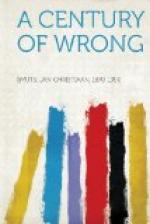That is much more important than the endorsement by any Englishman as to the historical accuracy of the statements which it contains. For what every judicial tribunal desires, first of all, is to hear witnesses at first hand. Hitherto the British public has chiefly been condemned to second-hand testimony. In the pages of A Century of Wrong it will, at least, have an opportunity of hearing the Dutch of South Africa speak for themselves.
There is no question as to the qualifications of Mr. F.W. Reitz to speak on behalf of the Dutch Africander. Although at this moment State Secretary for President Kruger, he was for nearly ten years Chief Justice and then President of the Orange Free State, and he began his life in the Cape Colony. The family is of German origin, but his ancestors migrated to Holland in the seventeenth century and became Dutch. His grandfather emigrated from Holland to the Cape, and founded one of the Africander families. His father was a sheep farmer; one of his uncles was a lieutenant in the British Navy.
Mr. Reitz is now in his fifty-sixth year, and received a good English education. After graduating at the South African College he came to the United Kingdom, and finished his studies at Edinburgh University, and afterwards at the Inner Temple, where he was called to the Bar in 1868. He then returned to the Cape, and, after practising as a barrister in the Cape courts for six years, was appointed Chief Justice of the Orange Free State, a post which he held for fifteen years. He was then elected and re-elected as President of the Orange Free State. In 1893 he paid a lengthy visit to Europe and to the United Kingdom. After Dr. Leyds was appointed to his present post as foreign representative of the South African Republic, Mr. Reitz was appointed State Secretary, and all the negotiations between the Transvaal and Great Britain passed through his hands.
Mr. Reitz’s narrative is not one calculated to minister to our national self-conceit, but it is none the worse on that account. Of those who minister to our vanity we have enough and to spare, with results not altogether desirable. In the long controversy between the Boers and the missionaries Mr. Reitz takes, as might be expected, the view of his own people.
An English lady in South Africa writing to the British Weekly of December 21st, in reply to the statement of the Rev. Dr. Stewart, makes some observations on this feud between the Boers and the missionaries, which it may be well to bear in mind in discussing this question. The lady ("I.M.”) says:—
Dr. Stewart naturally starts from the mission question. I speak as the daughter of one of the greatest mission supporters that South Africa has ever known when I say that the earliest missionaries who came to this country were to a very large extent themselves the cause of all the Boer opposition which they may have had to encounter. When they arrived, they found the Boers




